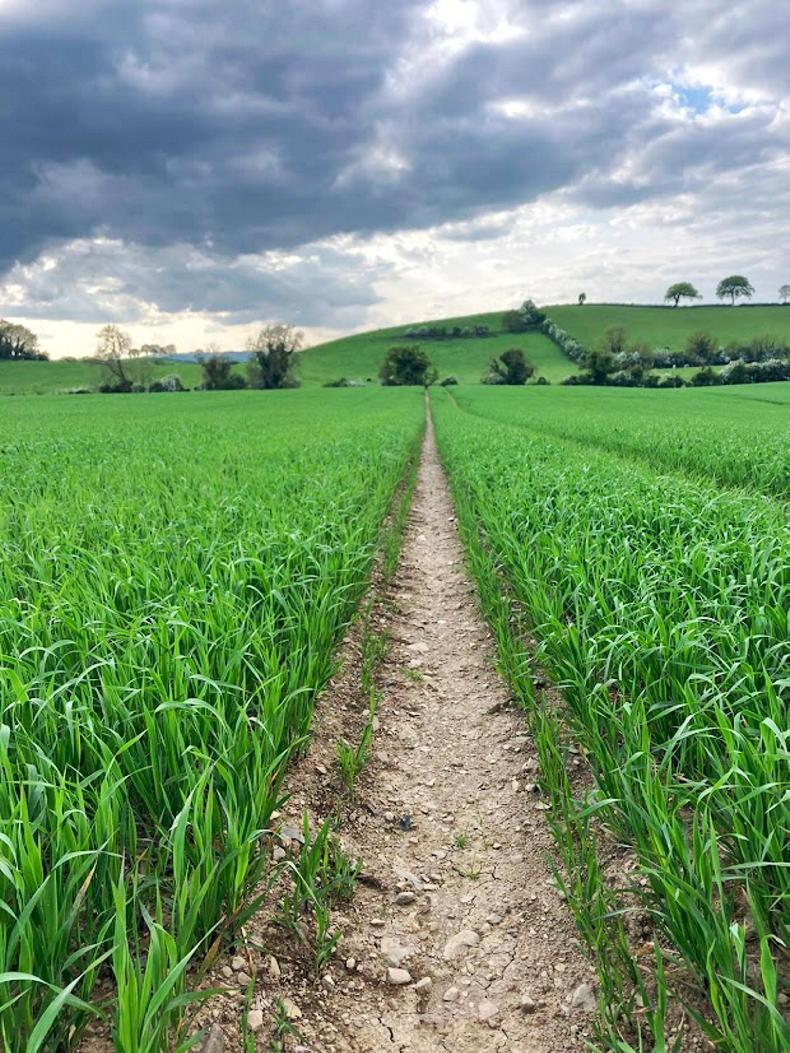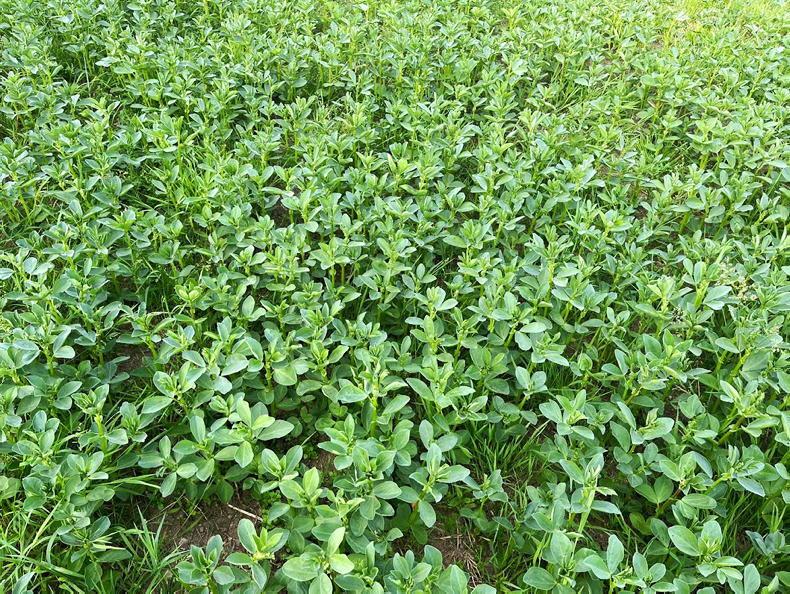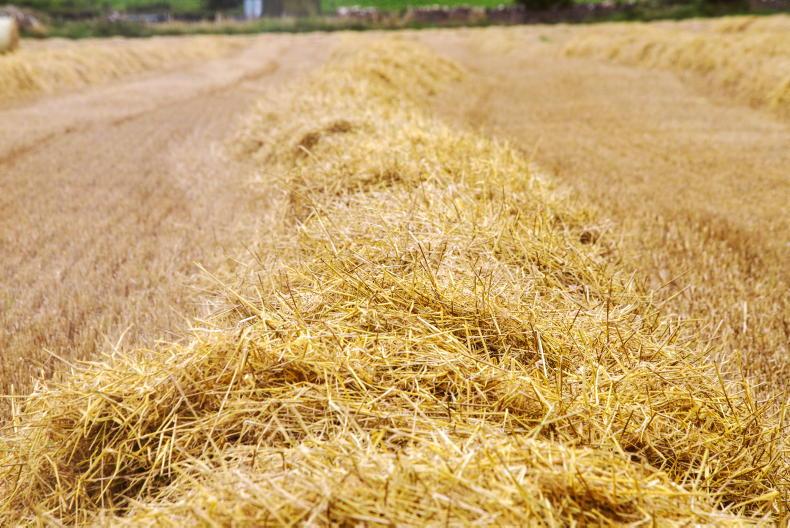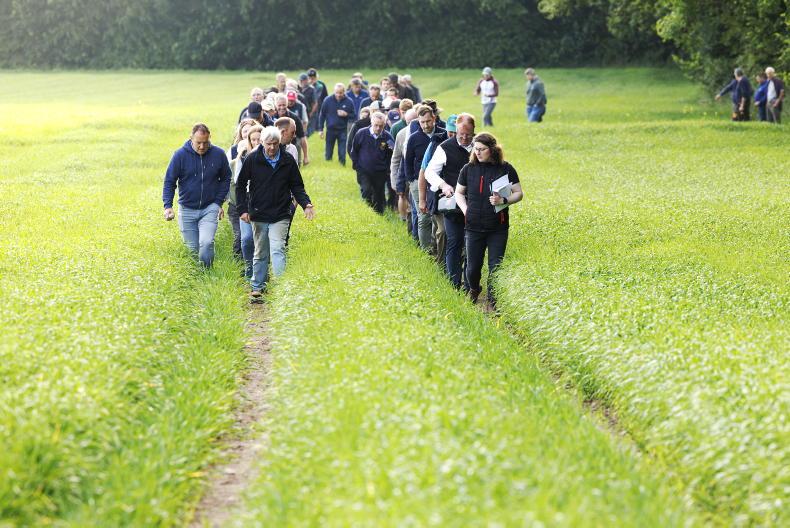The heavy showers experienced by many over the weekend did not reach Eamonn’s farm, with one small shower failing to keep the dust down.
The winter crops generally look well across the farm. The winter oilseed rape looks very clean and has good pod fill. The winter barley also looks good, with no ramularia present at all. It is just beginning to turn. Eamonn is very happy with both of these crops.
The winter wheat received a T3 of Prosaro (1l/ha) and Amistar (1l/ha) at mid-flowering on Saturday. The wheat looks quite well, with a small bit of tipping on Graham and KWS Dawsum. Eamonn says the dry spell came at the right time, as the new chemistry was just about keeping the Septoria at bay. Some 30l/ha of N16 will be applied to the crop soon.
Eamonn thinks the wheat will really benefit from it this year, with good potential and some CAN still lying on the ground, having not been washed in.

Spring oats on Eamonn's farm.
The winter oats look good, but Eamonn would be concerned if they received no rain soon.
Their final spray consisted of Prosaro (0.75l/ha) and Amistar (0.75l/ha).
The spring oats received Holdup 750 (1l/ha), Moddus 250 EC (0.15l/ha), Trinity 250, Tebuconazole and SuperFifty, a seaweed product, recently.
Eamonn remarks that they “don’t look terrible”, and have a good colour. However, if they don’t get rain soon, they may suffer badly.
The spring barley is every shade of green and yellow. While areas of fields with some shade or a bit of moisture look good, it is starting to yellow on lighter areas and hills.
It received a herbicide of Hurler (0.7l/ha) and Tribe 75 WG (15g/ha), along with an aphicide of Ninja (75ml/ha). This was followed up by Holdup 750 (1l/ha), Moddus 250 EC (0.15l/ha), Trinity 250 (0.4l/ha), manganese, zinc and SuperFifty.
Eamonn has yet to decide whether another fungicide will be applied at all. He will inspect the crop and the weather forecast when that time comes.
Crops were starting to suffer in Derry, but 10mm of rain on Saturday night has eased the pressure for now.
Alistair says that his winter oilseed rape looks good at present, with decent pod fill. He says that the crop which was grazed by sheep over the winter is faring worse than the crop that was not grazed.
Despite some benefits to the grazing, he will not graze any of his oilseed rape next year.
The spring beans which were drilled at the start of May have established well and are growing quite quickly. Alistair says that the dry weather has suited them so far and they are not yet stuck for moisture.
The winter rye looks excellent. This will be wholecropped at the beginning of July. The winter wheat also looks good and will be sprayed in the coming days.
The condition of the winter barley varies. The seed crop of KWS Tardis looked excellent until a few weeks ago. However, there are now a lot of BYDV patches over 60ac of this.

Spring beans are growing well on Alistair's farm.
Alistair hopes that it will not affect yield too much as the crop did not seem to be infected earlier in the season, and there were no aphids present. Due to large numbers of aphids in the past number of weeks, Alistair applied 25l/ha of milk from his dairy farm to the crop. This seems to have reduced aphid numbers by 50% to 60%.
It is also interesting to note that Alistair’s 10-way variety mix has not been affected at all and looks quite good. The Valerie winter barley does not look as good as the other crops.
Finally, as the farm is an AHDB monitor farm, there will be an open day on 26 June from 10.30am to 2.30pm. Everyone is welcome to attend, and more information can be found on the AHDB website or on the Carsehall Farm Facebook page.
Crops have been under pressure over the past number of weeks in Kilkenny, but Damien hopes that 8mm of rain over the weekend will provide some relief. Only 3mm had been recorded over three and a half weeks before this.
The winter barley has turned quickly over the past week. Damien says it is filling well, and the only disease is a small bit of ramularia.
The dry weather, in conjunction with the chemistry, has worked effectively on the winter wheat to prevent the spread of Septoria onto upper leaves. The flowering spray of Prosaro (1l/ha) was applied on 6 June.
The winter oats received Elatus Era (0.8l/ha) on 26 May. Damien notes that they are spotless, with no sign of any disease.
Turning to spring crops, the spring beans are suffering badly from the lack of moisture. They started flowering towards the end of May and were sprayed at this time with Signum (0.75l/ha). They are very clean but badly needed the rain over the weekend.
The spring oats have headed out. They were sprayed with Elatus Era (0.8l/ha) on 6 June, and look quite good. The spring wheat also looks good and is very clean. It received Revystar XL (1l/ha) and Arizona (1.5l/ha) on 2 June.
The maize has done well in the warm weather and is coming along nicely. Damien held off on applying a herbicide until rain arrived, so this was carried out over the past couple of days. Calaris (1.4l/ha) was applied.
Finally, the spring barley has powered through the growth stages over the past month. On 17 May, Cameo Max SX (35g/ha), Hurler (0.75l/ha), Ninja (50ml/ha), and Axial Pro (0.6l/ha) were applied.
A T1 of Proline (0.5l/ha) and Comet 200 (0.6l/ha) was then applied a week later.
The awns are now peeping and the final spray was applied on Monday. Siltra Xpro (0.5l/ha) and Stavento (1.5l/ha) were used. While the crop is clean, Damien says that it has thinned out in the past week.
The heavy showers experienced by many over the weekend did not reach Eamonn’s farm, with one small shower failing to keep the dust down.
The winter crops generally look well across the farm. The winter oilseed rape looks very clean and has good pod fill. The winter barley also looks good, with no ramularia present at all. It is just beginning to turn. Eamonn is very happy with both of these crops.
The winter wheat received a T3 of Prosaro (1l/ha) and Amistar (1l/ha) at mid-flowering on Saturday. The wheat looks quite well, with a small bit of tipping on Graham and KWS Dawsum. Eamonn says the dry spell came at the right time, as the new chemistry was just about keeping the Septoria at bay. Some 30l/ha of N16 will be applied to the crop soon.
Eamonn thinks the wheat will really benefit from it this year, with good potential and some CAN still lying on the ground, having not been washed in.

Spring oats on Eamonn's farm.
The winter oats look good, but Eamonn would be concerned if they received no rain soon.
Their final spray consisted of Prosaro (0.75l/ha) and Amistar (0.75l/ha).
The spring oats received Holdup 750 (1l/ha), Moddus 250 EC (0.15l/ha), Trinity 250, Tebuconazole and SuperFifty, a seaweed product, recently.
Eamonn remarks that they “don’t look terrible”, and have a good colour. However, if they don’t get rain soon, they may suffer badly.
The spring barley is every shade of green and yellow. While areas of fields with some shade or a bit of moisture look good, it is starting to yellow on lighter areas and hills.
It received a herbicide of Hurler (0.7l/ha) and Tribe 75 WG (15g/ha), along with an aphicide of Ninja (75ml/ha). This was followed up by Holdup 750 (1l/ha), Moddus 250 EC (0.15l/ha), Trinity 250 (0.4l/ha), manganese, zinc and SuperFifty.
Eamonn has yet to decide whether another fungicide will be applied at all. He will inspect the crop and the weather forecast when that time comes.
Crops were starting to suffer in Derry, but 10mm of rain on Saturday night has eased the pressure for now.
Alistair says that his winter oilseed rape looks good at present, with decent pod fill. He says that the crop which was grazed by sheep over the winter is faring worse than the crop that was not grazed.
Despite some benefits to the grazing, he will not graze any of his oilseed rape next year.
The spring beans which were drilled at the start of May have established well and are growing quite quickly. Alistair says that the dry weather has suited them so far and they are not yet stuck for moisture.
The winter rye looks excellent. This will be wholecropped at the beginning of July. The winter wheat also looks good and will be sprayed in the coming days.
The condition of the winter barley varies. The seed crop of KWS Tardis looked excellent until a few weeks ago. However, there are now a lot of BYDV patches over 60ac of this.

Spring beans are growing well on Alistair's farm.
Alistair hopes that it will not affect yield too much as the crop did not seem to be infected earlier in the season, and there were no aphids present. Due to large numbers of aphids in the past number of weeks, Alistair applied 25l/ha of milk from his dairy farm to the crop. This seems to have reduced aphid numbers by 50% to 60%.
It is also interesting to note that Alistair’s 10-way variety mix has not been affected at all and looks quite good. The Valerie winter barley does not look as good as the other crops.
Finally, as the farm is an AHDB monitor farm, there will be an open day on 26 June from 10.30am to 2.30pm. Everyone is welcome to attend, and more information can be found on the AHDB website or on the Carsehall Farm Facebook page.
Crops have been under pressure over the past number of weeks in Kilkenny, but Damien hopes that 8mm of rain over the weekend will provide some relief. Only 3mm had been recorded over three and a half weeks before this.
The winter barley has turned quickly over the past week. Damien says it is filling well, and the only disease is a small bit of ramularia.
The dry weather, in conjunction with the chemistry, has worked effectively on the winter wheat to prevent the spread of Septoria onto upper leaves. The flowering spray of Prosaro (1l/ha) was applied on 6 June.
The winter oats received Elatus Era (0.8l/ha) on 26 May. Damien notes that they are spotless, with no sign of any disease.
Turning to spring crops, the spring beans are suffering badly from the lack of moisture. They started flowering towards the end of May and were sprayed at this time with Signum (0.75l/ha). They are very clean but badly needed the rain over the weekend.
The spring oats have headed out. They were sprayed with Elatus Era (0.8l/ha) on 6 June, and look quite good. The spring wheat also looks good and is very clean. It received Revystar XL (1l/ha) and Arizona (1.5l/ha) on 2 June.
The maize has done well in the warm weather and is coming along nicely. Damien held off on applying a herbicide until rain arrived, so this was carried out over the past couple of days. Calaris (1.4l/ha) was applied.
Finally, the spring barley has powered through the growth stages over the past month. On 17 May, Cameo Max SX (35g/ha), Hurler (0.75l/ha), Ninja (50ml/ha), and Axial Pro (0.6l/ha) were applied.
A T1 of Proline (0.5l/ha) and Comet 200 (0.6l/ha) was then applied a week later.
The awns are now peeping and the final spray was applied on Monday. Siltra Xpro (0.5l/ha) and Stavento (1.5l/ha) were used. While the crop is clean, Damien says that it has thinned out in the past week.












SHARING OPTIONS